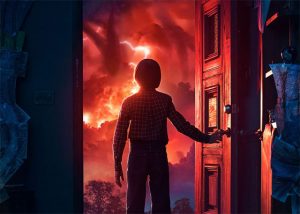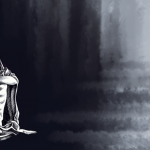
“Stranger Things” as an Analogy for the Effects of Mental Illness on Family, Friends, and Society
Spoiler Alert: This article contains spoilers about the Netflix TV series Stranger Things.

As a bit of a sci-fi nerd who grew up in the 80s and 90s with movies like E.T. and TV shows like The X-Files, I was quick to become a fan of the popular Netflix series Stranger Things when it aired in the summer of 2016. When Season 2 came out just before Halloween this year, I was one of millions who enjoyed bingeing on the series (while simultaneously consuming excessive amounts of bite-sized chocolate bars). Aside from being an overall well-done piece of dramatic, sci-fi/horror entertainment, some aspects of Stranger Things stood out to me as a particularly poignant analogy for mental illness – not only the effects on the individual, but the ripple effects on close family members, friends, and society as a whole.
Confrontations with Darkness
For those who have been affected by serious mental illness, it’s probably not a stretch to empathize with the horror and trepidation felt by young Will Byers (brilliantly acted by Noah Schnapp) as he is pursued by malevolent forces from an alternate dimension (a place that the child protagonists colloquially refer to as “the Upside Down”). In Season 1, Will is kidnapped by a monster (“the Demogorgon”) and taken to the alternate dimension; in Season 2, the evil forces from the Upside Down infiltrate Will’s body, using him as an incubator, and begin to effectively possess him (in a manner reminiscent of so many demonic possession horror films). The scene in which Will attempts to stand up to the evil forces pursuing him – following the well-intentioned but misguided advice of his mother’s boyfriend – is particularly heartbreaking: it becomes clear that Will isn’t dealing with ordinary childhood fears or the effects of an “overactive imagination,” but is in fact facing something that is very real and dangerous. Such is the case for many young people in our world as they struggle to navigate the complexities of their own humanity – struggles which commonly involve confrontations with both internal shadows and external obstacles.
it’s probably not a stretch to empathize with the horror and trepidation felt by young Will Byers (brilliantly acted by Noah Schnapp) as he is pursued by malevolent forces from an alternate dimension (a place that the child protagonists colloquially refer to as “the Upside Down”). In Season 1, Will is kidnapped by a monster (“the Demogorgon”) and taken to the alternate dimension; in Season 2, the evil forces from the Upside Down infiltrate Will’s body, using him as an incubator, and begin to effectively possess him (in a manner reminiscent of so many demonic possession horror films). The scene in which Will attempts to stand up to the evil forces pursuing him – following the well-intentioned but misguided advice of his mother’s boyfriend – is particularly heartbreaking: it becomes clear that Will isn’t dealing with ordinary childhood fears or the effects of an “overactive imagination,” but is in fact facing something that is very real and dangerous. Such is the case for many young people in our world as they struggle to navigate the complexities of their own humanity – struggles which commonly involve confrontations with both internal shadows and external obstacles.
Effects on the Family
 Many people’s lives are completely side-tracked, put on hold, or otherwise change direction due to mental illness. To people close to someone who is unwell, it can seem like the person they know and love is absent from their lives. Family members and close friends often become increasingly concerned and seek to find answers to the questions: “what is wrong with my loved one?” and “how can I fix it?” The desperation of family members is perhaps best exemplified in Stranger Things by Will’s mother, Joyce Byers, (portrayed by Winona Ryder): the frantic movements of eyes and furrowing of brows trying to make sense of an impossible situation; the frustration and anger at the seeming unfairness and randomness of her son’s condition; the fierce determination to do anything possible to find answers and help her son. People with loved ones affected by mental illness know the pain and helplessness behind the tears of Joyce and Jonathan Byers (Will’s older brother, actor Charlie Heaton) as they struggle to bring Will back from the grips of a force beyond their comprehension and control.
Many people’s lives are completely side-tracked, put on hold, or otherwise change direction due to mental illness. To people close to someone who is unwell, it can seem like the person they know and love is absent from their lives. Family members and close friends often become increasingly concerned and seek to find answers to the questions: “what is wrong with my loved one?” and “how can I fix it?” The desperation of family members is perhaps best exemplified in Stranger Things by Will’s mother, Joyce Byers, (portrayed by Winona Ryder): the frantic movements of eyes and furrowing of brows trying to make sense of an impossible situation; the frustration and anger at the seeming unfairness and randomness of her son’s condition; the fierce determination to do anything possible to find answers and help her son. People with loved ones affected by mental illness know the pain and helplessness behind the tears of Joyce and Jonathan Byers (Will’s older brother, actor Charlie Heaton) as they struggle to bring Will back from the grips of a force beyond their comprehension and control.
Often what is brushed off or misunderstood from the frame of reference of ordinary fears, anxieties, or sadness are in fact more extreme, pervasive, all-encompassing versions of such common human experiences. Past a certain threshold of severity, these experiences are today commonly diagnosed as psychiatric disorders. When I was a young teenager and began experiencing symptoms of what was later diagnosed as depression, I recall initially being told that I was going through the “pains of growing up” (today I understand my experiences back then as a budding awareness of existential angst). As my descent into the depths of addiction and mental illness progressed in my later teenage years, the negative effects on my family, particularly my parents, started to become evident. It’s clearer to me now in retrospect than it was to me during that period of my life how my behaviour had harmful effects on the people closest to me. I was blessed to be offered unconditional love and support from my family, which included them giving me the space to make mistakes, falter, and even fall on numerous occasions (something that I know through my work supporting the loved ones of people going through similar struggles is an extremely difficult thing to do). When I was ready and willing to get the help I needed, my family was there to support me; combined with professional help and a lot of hard work on my part, I was able to recover and turn my life around. I was one of the fortunate ones.
It Takes a Village
All too often, we view mental health issues through a hyper-individualistic lens, overlooking the fact that each one of us exists in a web of interconnected relationships. The quality of our well-being and our very lives as inherently social animals is largely determined by the quality of our relationships. Without the support and efforts of his close family and friends, Stranger Things’ Will Byers would certainly not have survived his confrontation with the darkness that had begun to consume him. Many of the least fortunate people in our society, those without strong networks of familial support or supportive social relationships, are often the ones who suffer most severely from the effects of mental illness (in addition to suffering from poverty, homelessness, and various other forms of trauma). For most people, it’s usually not enough to treat their mental illness from the perspective of “fixing a dysfunctional brain” via pharmaceutical or other medical interventions alone. If people are to truly heal, recover, grow, and ultimately flourish in society, they need the love and support of other people in the their lives. Because the greatest burden of care often falls on the spouses, parents, and siblings of those who are struggling with mental health issues, family members themselves need the support of their friends and communities to hold them up during difficult and trying times.

Like the infected underground tunnels that spread beneath the community of Hawkins, Indiana in Stranger Things, mental illness is not a problem that is limited only to those who appear to be suffering the most. While those who manifest psychiatric symptoms and fit diagnostic categories rightfully deserve attention and treatment, family members and close friends also need support and care to maintain their own health and wellness. Rather than being a force that tears families apart and alienates those who are afflicted, mental illness can be seen as a rallying cry for people to come together and support individuals and families who are suffering. It is through coming together that we can acknowledging our shared experiences of suffering, and in doing so break down the secrecy, stigma, and barriers to healing and growth that leave too many of us to face our demons alone.



